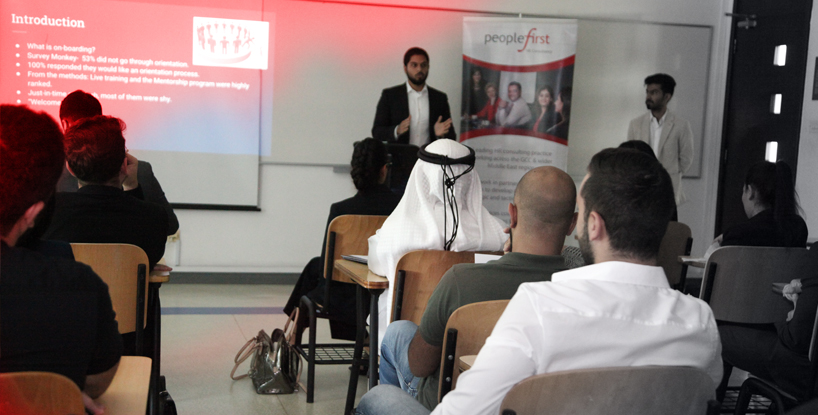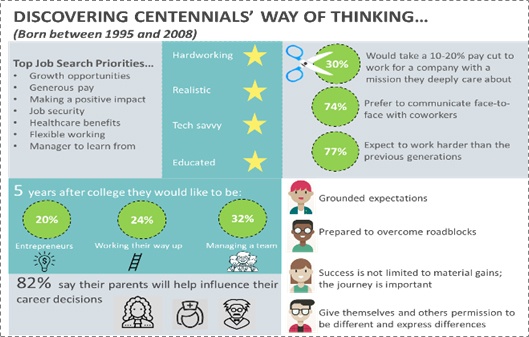Is your organisation ready for the Centennial workforce?
HH Sheikh Khalifa bin Zayed Al Nahyan, President of the UAE, declared 2017 as The Year of Giving. To contribute to this worthy initiative, PeopleFirst collaborated with American University in Dubai (AUD) to support students undertaking the HR Management module. Dedicating time and resources to this worthy cause, PeopleFirst worked in collaboration with the Assistant Dean and Associate Professor – Raj Kapoor, offering students the opportunity to work on a current business/HR related topic that will affect all organisations over the coming years – Preparing for the Centennial workforce.

Taking into consideration the syllabus of the HR Management module, PeopleFirst designed and supervised a project that required students to apply theoretical concepts, undertake a study and develop recommendations to address a variety of HR topics (see diagram on left) that employers, employees and HR teams alike, deal with on a day to day basis.
In this newsletter, PeopleFirst will share the recommendations from the project giving potential employers insights into the expectations of the Centennial generation.
In recognition of their efforts and in order to motivate the students, PeopleFirst donated a sum of AED 1,000 to the winning team (Job Design). The money was donated to Albustan Charity Association which was chosen by the students with the highest scores.
Let’s start by understanding more about the Centennial generation
Centennials, also known as Generation Z, are the generation of people born roughly between 1995 and 2008. It is expected that by 2020, Centennials will make up 20% of the workforce, making it important for us to understand how to prepare for the next Centennial workforce.
The most prominent difference between Centennials and other generations is that Centennials have never experienced a world without the internet. They have been brought up in vastly different circumstances than the Millennials, shaping them to be more tech savvy, educated, and can achieve what they set out to do with greater efficiency because of easier access to information.
The illustration below looks at Centennials in more detail:
Winning Team: Leon Halal, Sarah Farah, Sofiya Karaboikova, Mohammad BinHendi, Richelle Soni, Diana Saloum
HR Topic: Job Design
Task: Design the ideal job for a Centennial which includes job purpose, job title, job role and responsibilities, working hours and employee expectations
The key research findings and recommendations presented by the winning team are summarized below:
- Job Autonomy: Centennials like to be in control of their progress and are willing to work hard when they are passionate about the results. 40% of the respondents said they want to be accountable for their actions and 34% agreed that they prefer a decentralized organization structure. The students recommended that future employers take advantage of this insight by redesigning the organization’s hierarchy in a way that would allow Centennials to work under limited supervision with more room for creativity and accountability.
- Job Variety: Centennials have shorter attention spans than the generations that preceded them and they excel at multi-tasking, making them more inclined towards task variety in their jobs. Only 30% of the respondents showed preference for working on a single task at a time, while the majority (49%) of respondents wanted to experience a variety of tasks in their job roles. Therefore, we recommend that employers broaden the scope of jobs in order to boost motivation levels, employee engagement, and productivity amongst Centennials.
- Flexible Working: Centennials not only enjoy variety in job tasks, but also look for flexible working arrangements. The students reported that when it comes to flexibility about when, where and how they work, Centennials prefer not to be restricted by rigid rules such as fixed work timings and fixed desk spaces. Research indicates that Centennials find it unfair to be considered ‘late’ for work if they arrive fifteen minutes after the start time, which in their opinion, can be made up at the end of the work day. The students recommended that employers should include flexible working hours in their HR policies and focus more on the quality of work rather than time spent at work. In addition, we recommend introducing ‘hot-desking’ as an innovative way to encourage a flexible and friendly work environment.
Team: Ayan Ali, Joe Karam, Zubier Hammadi, Mohamed Hamoud, Saakshi Rochlani
HR Topic: Onboarding
Task: Design an Onboarding process tailored to the needs of Centennials
The students at AUD surprised us with an in-depth report on what Centennials expect on joining the workplace. The research findings are summarized below:
- Centennials are tech savvy and learn better through interactive videos / activities as opposed to an oral introduction to concepts. We recommend that employers use gamification to introduce the organization’s vision, mission, values and key policies.
- Centennials are more productive in a friendly work environment and employers can break the ice by inviting the new joiner to a team breakfast/lunch as soon as they join. In addition, the students recommended that employers should develop a ‘buddy’ system to introduce them to the organization and guide them through the first few weeks of employment.
- On the job training was a popular recommendation amongst the students because research suggests that the education system today does not fully prepare Centennials for the workplace and they expect to develop their skills on the job.
- The students recommended that employers provide a welcome kit to all new joiners and include in it the job description, organization chart, employee handbook, etc. We recommend making it more interesting by providing the welcome kit in the form of a mobile app which they can easily download and access in their own time.
- Further research on the topic suggests that offering company branded gifts like a mug, stationery, t-shirt and stickers help develop a positive image of the company when Centennials’ share photographs of their branded welcome gifts on social media networks.
We strongly recommend that Onboarding should not be a short-term process, but rather new joiners should be mentored throughout their employment with the company.
Team: Heba AlSawalhi, Omar Sabban, Abdulla Ghazali, Bassem Abou Daya, Hamza Barahim, Ahmad Khaled
HR Topic: Career Development
Task: Design a career development process that balances the needs of an organization whilst motivating Centennials to grow with the company
27% of Centennials believe they should stay in their first job for a year or less. For employers, this can mean potential employee retention problems, which they can solve through the application of career development initiatives. Research on the topic revealed:
- Centennials place great emphasis on personal growth. If their needs for personal development are not met, they will not hesitate to look for a new job that offers better professional growth opportunities.
- Centennials have received more guidance from their parents and teachers than any other generation before them, which is why they expect some direction from their employers. Therefore, they expect to be mentored and trained continuously without being micromanaged.
- Centennials want to make an impact. They have specific expectations of how they want their career to progress and they look to their managers for one to one feedback on how they can continue to develop themselves in order to achieve professional success.
- Centennials value job security. Therefore, if a company invests in the development of its employees and keeps them engaged, the employer will be able to implement a successful succession planning framework, developing the next generation to become effective leaders!
We recommend that employers focus on customizing the career development framework to meet the expectations of the new generation in order to increase employee retention and also encourage professional growth amongst their employees.
Team:Ali Owji, Deena Abu Al Saad, Gurmeet Kapoor, Jimmy Bleibel, Mutasem Kuttenie
HR Topic: Recruitment
Task: Design a robust recruitment process that is tailored to attract Centennials
The research conducted by students on this topic focused mainly on answering the questions around what will enable potential employers to attract Centennials.
- The students found that Centennials value social aspects of the work environment more than anything else when they are looking for a new job. Having good relationships with colleagues and their bosses, working in a happy environment and being surrounded by supportive and encouraging colleagues is important to them. Therefore, we recommend that employers focus on creating a positive work environment that encourages teamwork, mentoring and positivity. Employer branding can play an important role in attracting Centennials.
- The next thing Centennials look for when they apply for a new job is promotion opportunities in the workplace and an above average compensation & benefits package. While everyone wants a better salary package, Centennials are more eager to earn their way to the top. Therefore, it is important for employers to introduce the opportunities for growth while recruiting for the new position.
- Centennials also look for challenging work and innovative employers that encourage forward-thinking. One of the ways through which employers can demonstrate this creativity and open-mindedness is by using innovative means of advertising vacancies.
We suggest that employers do not ignore any aspect of these findings when designing an advertisement for recruitment.
Team: Dana Ismail, Hakim Hussein, Sandra Ghorayeb, Sultan Mohamed, Muhammed Al Gargawi
HR Topic: Compensation & Benefits
Task: Design a Compensation & Benefits framework to help attract and retain a young Centennial
The students found that Centennials value transparency and would like to know that the company follows a fair and transparent grading system that justifies why employees are paid differently. The research indicates:
- Centennials are not only looking for monetary rewards, but are looking for benefits such as flexibility in working hours, health club memberships, corporate discounts for retail and hospitality, health insurance and interest free car loans. The students suggested that Centennials are likely to stay longer with a company that offers such benefits.
- Centennials value having benefits and compensation personalized around their individual lives rather than receiving fixed and standard packages. Therefore, employers may benefit from looking for innovative and personalized ways to reward their employees in non-monetary terms.
- Centennials are likely to pursue further studies after starting their careers. A popular benefit that Centennials seem to seek from their employers is allowance for further studies. This can be a benefit not only for the employee, but also for the employer.
Team: Basel Abotteen, Nawar Aji, Mustafa Hassan, Khaled Rahmo, Joseph Zakhia
HR Topic: Performance Management
Task: Design a performance appraisal process for Centennials, considering the frequency of reviews, employee ratings, link to reward and handling poor performance
The students suggest that the key to better operational performance is effective performance management.
- Centennials want instant feedback on their performance and they prefer to receive this feedback in person because they see it as an important contributor to their personal and professional growth. Therefore, we recommend that employers provide constant feedback in order to obtain immediate results. The focus of appraisals should be performance development and instant feedback is likely to have positive results.
We enjoyed the experience of working with the students and faculty at AUD and were impressed with the quality of work presented to us. We wish potential employers the best of luck in attracting and retaining the new generation workforce!


